CHOOSING BETWEEN FAMILY AND FUTURE
In xenophobic times wracked by exclusionary panics, any immigrant’s odyssey speaks for millions of refugees, within as much as outside the U.S.. Truth-based and potent with ethical dilemmas, Objects in the Mirror (its title alluding to the fears that follow fugitives) is a Goodman Theatre world premiere that puts a ton of pain in raw perspective. Charles Smith pays complex tribute to an African actor he met in Adelaide, Australia. The Chicago playwright chronicles the edifying journey of a Liberian named Shedrick Yarkpai: Thickening the plot, he has carried other names, like Zaza, Workolo and Kennedy’”and therein lies this tale.
Beyond the role that he played in Smith’s 2009 revival of Free Man of Color, Shedrick had a survival story to share. Powerfully shaped by director Chuck Smith, Objects is a harrowing and ultimately liberating tale about life and death in hellhole migrant camps, about bloody civil wars in West African that make no distinctions between tribal victims and boy soldiers, innocents and criminals, and about identity theft in the largest sense.
Brilliantly depicted by Mike Tutaj’s projections against a corrugated-iron backdrop by Riccardo Hernandez, the first act is a flashback from Shedrick’s new home in Australia where he’s currently coping with a racial slur from a local bus driver. Helping Shedrick with this and other moral matters (and paying him to paint his carport) is Rob Mosher (Ryan Kitley), the white lawyer and guardian who has helped Shedrick (dynamic young Daniel Kyri) to secure a new life under his real name. Mosher is an authentic Samaritan who’s become a lifesaver for a lad who’s endured a dozen years (1995-2007) of narrow escapes, bureaucratic barriers, malaria, dysentery and cholera, and constant losses of kin and friends in war-raved Liberia as well as emigrant camps in Guinea and Cote d’Ivoire.
For Shedrick, a future actor, survival means learning how to “tell a story.” Teaching him to trust no one and to lie about who he is, why he’s where he is, and what he’s here for is Shedrick’s deeply distrustful uncle John Workolo (Allen Gilmore), a wary soul who sees only the worst in humanity. (To be fair to John, that’s mostly what there was to witness.) Fleeing Monrovia, Shedrick parts from his mother Luopu (Lily Mojekwu) who tells him to obey John in everything and to do everything he can to survive. He also loses John’s rebellious, machete-wielding son and Shedrick’s cousin Zaza (Breon Arzell), who runs off to join Charles Taylor’s vicious rebels and die early, his body dumped in a cesspool.
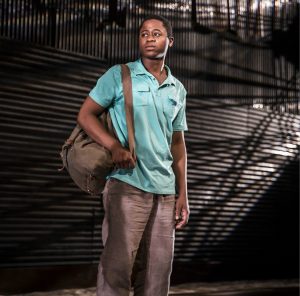 Somehow it seems necessary for Shedrick to assume dead Zaza’s name and identity in order to pass border controls and reach the Ivory Coast, Guinea’”and finally Australia (suggested in the second act by a cyclorama of a long, empty, and sweet beach under the bluest sky imaginable).
Somehow it seems necessary for Shedrick to assume dead Zaza’s name and identity in order to pass border controls and reach the Ivory Coast, Guinea’”and finally Australia (suggested in the second act by a cyclorama of a long, empty, and sweet beach under the bluest sky imaginable).
But Africa’s lethal legacy follows Shedrick down under and into exile. Because of the fraudulence he continues to maintain (supposedly to preserve their freedom), paranoid John fears deportation. This pretend father refuses to let a haunted Shedrick drop Zaza (a modern “ghost”) and assume the real identity he must reclaim. (“It’s just a name,” John lamely argues.) He cynically rages that to be black is to be either a commodity or a liability, that there’s danger in relaxing into what’s real. John hides crucial information that Shedrick needs to know about his mother. Worse, he suspects Rob’s motives for befriending his nephew: This “confirmed bachelor” has devious intentions for his unforced altruism, reasons the homophobe (and some in the opening night audience agreed). Teaching Shedrick too well not to trust anyone, all-controlling John deserves to forfeit the dependence he demands.
In the end Objects is a tale of two “fathers,” neither the actual parent. Trying too even-handedly to maintain a balance between the uncle and the guardian, Smith denies the audience “closure” about which path Shedrick will pick (even though his final name makes that course clear). Our last sight of Shedrick Yarkpai is Kyri as a silhouette on the beach, flinging his arms out to embrace the ocean and his second life as an actor-émigré. From now on, we must believe, the only deception the former “Zaza” will practice will be artistic, not political.
Charles Smith enlightens well, shedding lovely light on ugly stuff’”how the massacres of civil wars poison the soul with false dread and true, how immigrants struggle daily to preserve their integrity along with identity, and how families can shrink from loved ones to ruthless survivors, their love lost because it’s a luxury refugees can’t afford.
Chuck Smith’s five-member cast manage to fill the vast Goodman stage with agonizing “case histories” well beyond their number. Never has playing the moment mattered more than in this 135-minute epic of perils. Seldom has trusting in the truth been less abstract or more ideological. Redemptively, Shedrick “Zaza” Kennedy Workolo Yarkpai found a better “mirror” in Australia than the one he brought from Africa. Seeing is believing.
photos by Liz Lauren
Objects in the Mirror
Goodman Theatre
Albert Theatre, 170 North Dearborn
ends on June 4, 2017
for tickets, call 312.443.3800
or visit Goodman Theatre
for more shows, visit Theatre in Chicago
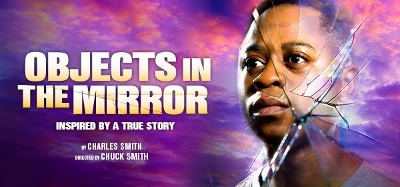
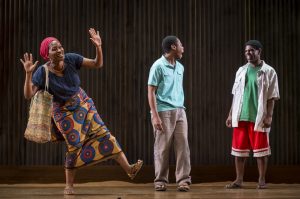
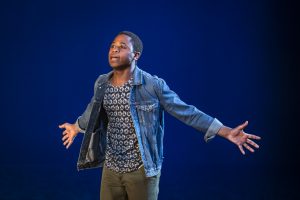
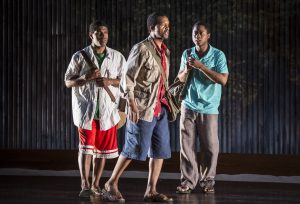
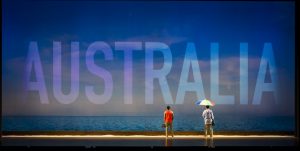
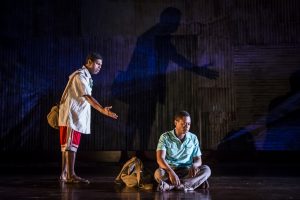
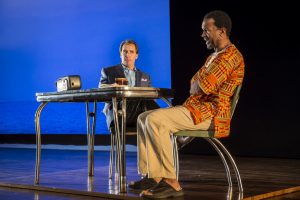
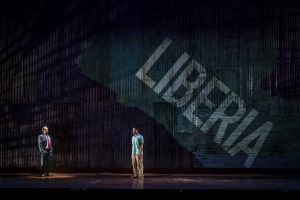
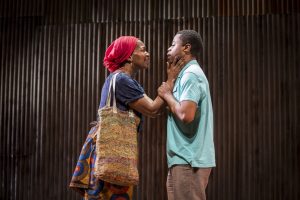
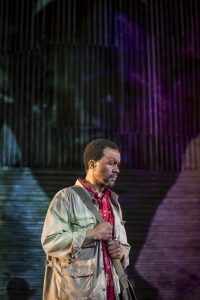

{ 2 comments… read them below or add one }
I saw this play in Chicago and walked out dazzled. Having attended the major plays in Manhattan this season, I was not expecting to see the finest production and play of the season in Chicago. Mr. Bommer most correctly underlined the realities and endless conflicts the young hero faces both in society and inside himself as he seeks to survive and find meaning in life beyond survival. This critic might have underlined even more: that lying is a necessity in the life of a subaltern figure. The uncle has the darkest view of humanity but he is a survivor. The hero wants to have his own authenticity and not just survive. The play asserts that sometimes we must learn to have inner authenticity and lie to survive outside. Mr. Bommer gives a positive ending to the ambiguity of the conclusion (I believe it is a suicide we are witnessing).
This is fantastic story. It must be played in nations across the world where there are refugees.